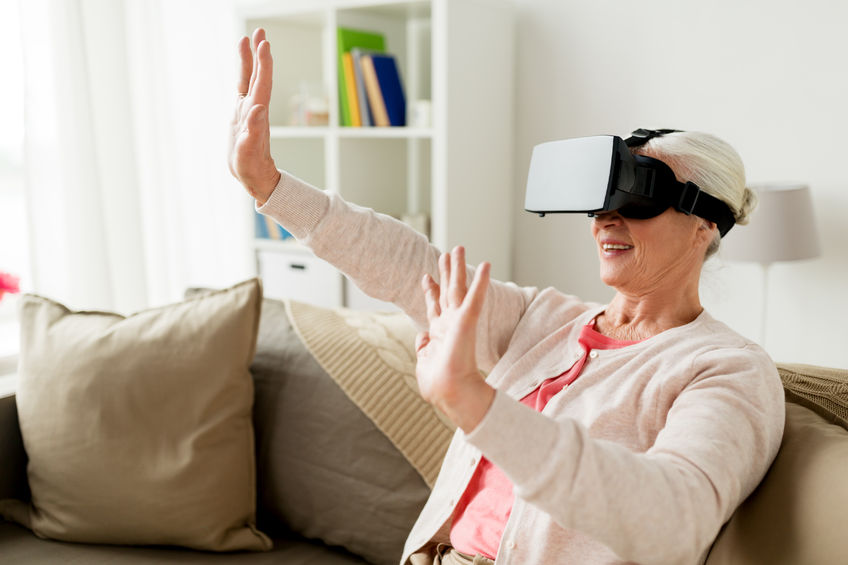Node Smith, ND
Reminiscence is a Powerful Model of Dementia Care
A new virtual reality platform is helping elderly individuals with dementia connect with past memories. Wayback, is a specially designed virtual reality experience that has been created with the specific purpose of helping those with dementia interact with emotionally powerful memories, and feel enjoyment. The virtual reality tool was made through a growing understanding that reminiscence is a powerful model of dementia care. Using photographs, props, role playing, and music from a person’s past to create a sense of belonging and positive experience is very supportive to those struggling with dementia.
By Creating Scenarios where a Family Member can Experience a Sense of Joy and Happiness, Everyone Wins
It used to be the convention for family members of people with dementia to “be truthful” and tell them the factual reality of what is going on in the world and their lives. This has been overturned in recent years with the understanding that by creating scenarios where a family member can experience a sense of joy and happiness, everyone wins. Instead of dementia being a constant cloud of gloom over a family, opportunities for reminiscence allow for connection and positive emotions.
Wayback
Wayback, is a headset that a smartphone is placed into to make a virtual reality screen. Currently, the “scene” that the developers are utilizing is a re-enactment of the 1953 Queen’s coronation (Wayback is an English organization). The elderly individuals who have utilized it have been amazed. They are able to look around, and are literally transported back in time, giving them a “huge amount of pleasure and really engaging” them.
The Technology allows for a way out of the Anxiety that affects those with Dementia
Family members have commented that the technology allows for a way out of the anxiety that affects those with dementia, as they worry about “what they should be doing.” Creative ideas for offering positive experiences is priceless for dementia caregivers. This technology could be adapted and utilized in many different populations, and also offers the question of whether the scenes need to be re-enactments, or if nature scenes of specific places, or even an interactive map which allows vistas of well-known cities could have a similar effect.
Image Copyright: <a href=’https://www.123rf.com/profile_dolgachov’>dolgachov / 123RF Stock Photo</a>
 Node Smith, ND, is a naturopathic physician in Portland, OR and associate editor for NDNR. He has been instrumental in maintaining a firm connection to the philosophy and heritage of naturopathic medicine among the next generation of docs. He helped found the first multi-generational experiential retreat, which brings elders, alumni, and students together for a weekend camp-out where naturopathic medicine and medical philosophy are experienced in nature. Four years ago he helped found the non-profit, Association for Naturopathic ReVitalization (ANR), for which he serves as the board chairman. ANR has a mission to inspire health practitioners to embody the naturopathic principles through experiential education. Node also has a firm belief that the next era of naturopathic medicine will see a resurgence of in-patient facilities which use fasting, earthing, hydrotherapy and homeopathy to bring people back from chronic diseases of modern living; he is involved in numerous conversations and projects to bring about this vision.
Node Smith, ND, is a naturopathic physician in Portland, OR and associate editor for NDNR. He has been instrumental in maintaining a firm connection to the philosophy and heritage of naturopathic medicine among the next generation of docs. He helped found the first multi-generational experiential retreat, which brings elders, alumni, and students together for a weekend camp-out where naturopathic medicine and medical philosophy are experienced in nature. Four years ago he helped found the non-profit, Association for Naturopathic ReVitalization (ANR), for which he serves as the board chairman. ANR has a mission to inspire health practitioners to embody the naturopathic principles through experiential education. Node also has a firm belief that the next era of naturopathic medicine will see a resurgence of in-patient facilities which use fasting, earthing, hydrotherapy and homeopathy to bring people back from chronic diseases of modern living; he is involved in numerous conversations and projects to bring about this vision.




